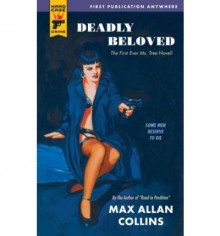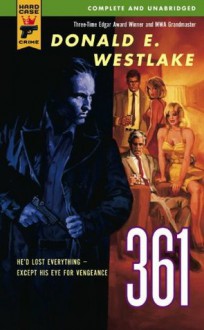



Lightweight piffle. One year after John Huston put “The Treasure Of The Sierra Madre” into cinemas Old Man Lovejoy – a ‘heart case in a wheel chair, with a good-looking nurse’ – hires manly Al Colby to safeguard a packet of Incan parchment telling of “the Treasure of Amarú”. An adventure singularly lacking in thrills ensues.
The first third of this is pure ‘Death On The Nile’ but that’s not necessarily a bad thing. There is a lot of fun to be had on-board a boat, leaving poker games early to creep about deck in the dead of night while pretty girls get threatened, cabins get ransacked and grandees get offed. It’s an atmospheric setting with a bit of mystery and skulduggery thrown in and this reader strongly suspects the travel-loving David Dodge thought so too, possibly magicking his Peruvian diaries into this slight affair. Once shacked up in the Hotel de Turismo (hotels are fastidiously namechecked) Colby keeps running into his shipmates, fending off the amorous advances of tipsy Julie or getting tied up by the dastardly Jeff. Everyone wants that pesky parchment it turns out and Colby – mouthing the words, one suspects – reads of Incan gold stashes and treasures beyond belief. He’s duped by a man he was warned of, tied up, shot, falls for obvious delaying tactics on-board ship and is surprised when the man he is expecting to double-cross him double-crosses him. One suspects Mr Bean might have made a better fist of proceedings,
This would make for an average episode of ‘Danger Man’ or a so-so entry in a ‘Stories For Boys’ anthology but it’s thin gruel post ‘Raiders Of The Lost Ark’. What this needs in the middle of it all is a whisky-soaked bruised romantic – say, one Humphrey Bogart – but Dodge is too blissed out on Vitamin D to venture into hard-boiled waters. It’s a perfectly amenable, even moreish read, but the Hard Case Crime cover promises waaaaay more than the novel delivers. Save this for a couple of hours in a departure lounge. “Adiós, smart guy.”

Sex-bomb manipulates player into offing her money-bags husband but the person really pulling the strings is the author. This starts off in familiar waters but Block’s plot turns are, as usual, quite delicious and the narrative ends up going to some surprisingly nihilistic places
This short novel is about dependency in all its forms and it must have been a right old shocker in 1960. Frankly, it features scenes that wouldn’t be out of place in the latest series of ‘True Detective’. Twenty-something Joe Marlin is a drifter, a non-payer of hotel bills, a seducer of women, a gigolo. Think the Steve Martin character in ‘Dirty Rotten Scoundrels’ minus the laffs. There’s certainly a vicarious thrill to be had in telepathising yourself into a life that thumbs its nose at any rule or hotel bill but you soon start looking to see where the royal kick in the arse that Joe deserves is going to come from. Enter Mona Brassard. Yes, she’s the world’s greatest piece of eye-candy – these types always have to be to galvanise their man into murderous action and for him to get jolly pissed when things don’t go his way – but she’s also front and centre in coincidences which both the observant reader and the author know are all too convenient. ‘Grifter’s Game’ is self-aware, Joe is too, and Block is fleet of foot in leveraging this for plot goodness. There are three delicious plot turns in the first 30 pages and 55 years later the great man is still at it in 2015’s ‘The Girl With The Deep Blue Eyes’. When the first twist happens you want to hug Block as you hunker down in your reading chair, knowing you’re in good authorial hands.
The novel jettisons the grifter angle fairly early on and proceeds through Joe’s shabby little plan, the bang-bang itself, and then the wheels inevitably coming off as the dratted dame starts stirring the pot. Mona, however, is not quite outed as some great eminence grise and nor does Joe get left in the gutter as she jets it off to Monaco, leaving him and us to reflect wryly on the absurdity of existence. Oh no. This is Lawrence Block we’re talking about, a Grand Master of the Mystery Writers of America . Fiend Block even dangles escape in the form of Nan Hickman in front of Joe and there is no reader who won’t be yelling at Joe to take what money he has and clear out to a life with her. Joe has every opportunity to walk away from this road show and that he doesn’t is the killing blow. That’s why the novel ends with him (beyond contempt, by the way, for what he does to Mona) contemplating a life down the drain for himself. Joe is despicable but Block lets us know – not that we need telling – that it’s the self-loathing that will do for him in the end.
I think there’s a case to be made for an edition of ‘The Quotable Block’, there are pull-out lines dotted all the way through this: “I thought like clocks tick”, “I drank bourbon and thought about murder”, “Eve learned that one the day they got dressed and moved out of Eden”. Mid twentieth-century man-fic still works like gangbusters because as in Shakespeare (‘Macbeth’ gets a name check in ‘Grifter’) we get to live for a while in the shoes of naughty people doing naughty things, satisfying our schoolboy ids, before sentence is imposed, usually by the Universe, thereby appeasing our nobler, censorious, selves. All done in prose that sings. These days ‘Grifter’ would make for a fine one episode vacation from the main proceedings of a hit show, something like the Jesse and Jane narrative in ‘Breaking Bad’. Wait a minute. Lawrence Block writing for ‘Breaking Bad’? Now there’s an idea…
 Apparently, this is a "lost novel" by Cain, which was only unearthed, edited, and published some 35 years after his death. I'd read some Cain previously, and very much loved Mildred Pierce. While, The Postman Always Rings Twice was ok, it wasn't all that special. I've yet to find Double Indemnity on kindle in a local library (now I have, and it's on hold). Anyway, I got this book thanks to my new library card with the Woburn Public Library, and it was great. Up there with Mildred Pierce, I think.
Apparently, this is a "lost novel" by Cain, which was only unearthed, edited, and published some 35 years after his death. I'd read some Cain previously, and very much loved Mildred Pierce. While, The Postman Always Rings Twice was ok, it wasn't all that special. I've yet to find Double Indemnity on kindle in a local library (now I have, and it's on hold). Anyway, I got this book thanks to my new library card with the Woburn Public Library, and it was great. Up there with Mildred Pierce, I think. 
After Raymond Kelley, a recently discharged Air Force soldier, witnesses the murder of his father and is horrifically maimed in the aftermath, he decides it’s time for paycheck. With only one word and a vague description of the murderer’s car to go on, Raymond and his brother quickly find themselves waist-deep in a web of danger, deceit, and mobsters. Little do the brothers know that they’re being hunted, too…
361 is, without a shadow of a doubt, the quintessential hard boiled crime novel. Westlake’s writing exemplifies the stylized grit and action-packed drama of the genre, almost to a fault. Between the endless comma splicing and endless descriptions of everything Raymond finds remotely interesting, it’s clear that the meat of the book lies in its style more so than its story. Yet even so, Westlake’s narrative never loses its quick pace nor does it ever delve into pointless sleaze like many other pulpy crime stories of the time. The greatest strength of his writing, however, is the characters. Westlake is a master at throwing flawed individuals into an impossible situation without sacrificing their likability. Everyone feels realistic at the end of the day, which is a rare find in an otherwise pulpy outing.
While the short standalone novel sometimes flirts with interesting themes, such as regret and old age, it never does deeper than the occasional subtext. Westlake’s ideas on what the post-Prohibition mob scene was like is also quaint in hindsight, as history has since shown us that the real-world Mafia didn’t simply fall apart after the legalization of booze. The problem's not on Westlake, though—it’s not his fault the book was published a year before Joseph Valachi’s tell-all testimony as the first mob informant for the FBI. Considering how badly most stories from the 60s age, inaccurate gangster representation is far from the worst sin such a book can commit.
On a side note, the Kindle port is lazy. The first 3% of the kindle edition contains an excerpt from the beginning of the book, so the reader might end up reading it twice if they don’t realize what they’re looking at.